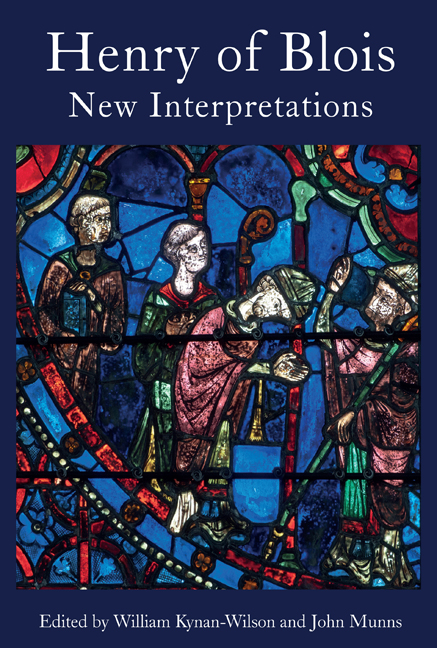Book contents
- Frontmatter
- Dedication
- Contents
- List of Illustrations
- List of Contributors
- Acknowledgements
- List of Abbreviations
- Genealogical Table: The Family Connections of Henry of Blois
- Introduction: Approaches to Henry of Blois
- 1 Causa Dei Et Ecclesie Cluniacensis: Henry of Blois and Cluny
- 2 Henry of Blois and His Legation in England
- 3 The Episcopal Colleagues of Henry of Blois
- 4 The Architectural Heritage of Bishop Henry of Blois at Winchester Cathedral
- 5 Wolvesey: Henry of Blois’ Domus Quasi palatium in Winchester
- 6 Bishop Henry’s Bible
- 7 Henry of Blois and the Construction of Roman Identity
- 8 Henry of Blois: Between Patronage and Representation in the Long Twelfth Century
- 9 The Last Days of Henry of Blois
- Timeline
- Bibliography
- Index
- Plate Section
Introduction: Approaches to Henry of Blois
Published online by Cambridge University Press: 09 February 2021
- Frontmatter
- Dedication
- Contents
- List of Illustrations
- List of Contributors
- Acknowledgements
- List of Abbreviations
- Genealogical Table: The Family Connections of Henry of Blois
- Introduction: Approaches to Henry of Blois
- 1 Causa Dei Et Ecclesie Cluniacensis: Henry of Blois and Cluny
- 2 Henry of Blois and His Legation in England
- 3 The Episcopal Colleagues of Henry of Blois
- 4 The Architectural Heritage of Bishop Henry of Blois at Winchester Cathedral
- 5 Wolvesey: Henry of Blois’ Domus Quasi palatium in Winchester
- 6 Bishop Henry’s Bible
- 7 Henry of Blois and the Construction of Roman Identity
- 8 Henry of Blois: Between Patronage and Representation in the Long Twelfth Century
- 9 The Last Days of Henry of Blois
- Timeline
- Bibliography
- Index
- Plate Section
Summary
The challenge of characterising the subject of this volume is immediately apparent: what do we call him? A plethora of options present themselves: Henry of Blois, Henry of Glastonbury, Henry of Winchester, even Henry of Cluny? Each name relates to a different aspect of this man's life: his noble origins as grandson of William the Conqueror and a child of the count of Blois; his training as an oblate and monk at the great abbey of Cluny; his nomination by his royal uncle, King Henry I, to govern one of the wealthiest abbeys (Glastonbury) and then – in plurality – one of the most prestigious dioceses (Winchester) in the English Church. Having helped orchestrate his brother Stephen's accession to the thone after their uncle's death, Henry would go on to continue the role of kingmaker in the civil war between Stephen and King Henry's daughter Matilda, at the same time as presiding over the English Church in the office of Papal Legate. Later in life, he would come to the rescue of his motherhouse as de facto abbot of Cluny and, once he was back in England again, it would fall to Henry to consecrate Thomas Becket as archbishop of Canterbury. These are just the headline roles of a long and influential life as nobleman, monk, abbot, bishop, legate, and lord.
There are other monikers in contention too. Some differ subtly and reflect the changing fashions of scholarship. Take, for instance, the shifting language of his official biography in the ODNB, where he was first called Henry of Blois in 1891 (by William Hunt) and later Henry de Blois in 2004 (by Edmund King). Other names eschew any semblance of nuance and serve to conjure up the extremes of his character or reputation. According to an anonymous Winchester monk, Henry was a latter-day Cicero; for Bernard of Clairvaux, he was ‘that old whore of Winchester’.
The complex and often contradictory nature of Henry of Blois is famously encapsulated in the language of Henry of Huntingdon's De contemptu mundi. Writing between May 1133 and August 1135, he commented: ‘Now there sits in their place [the previous bishops of Winchester] Henry, nephew of King Henry, who will be a new kind of monster, composed part pure and part corrupt, I mean part monk and part knight’.
- Type
- Chapter
- Information
- Henry of BloisNew Interpretations, pp. 1 - 25Publisher: Boydell & BrewerPrint publication year: 2021



